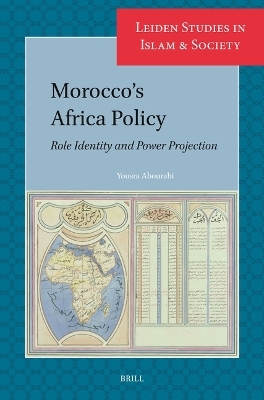
Morocco’s Africa Policy
Brill (Verlag)
978-90-04-54661-5 (ISBN)
Yousra Abourabi, Ph.D. (2016), is an Associate Professor of Political Science at the International University of Rabat. She has published a monograph as well as many papers on Morocco and African governance, including Maroc (De Boeck, 2019) and the current book in its French version (Brill, 2020). She is both a member of the ECOSOCC (African Union) and of the Global Campus for Human Rights.
Foreword
Abbreviations
Introduction
1 ‘Morocco takes the South’: Apollonian or Dionysian impulse?
2 The Arab and African Worlds in the Study of International Relations
3 A Constructivist Approach to Identity
4 The Challenge of Multi-disciplinarity in the Study of Moroccan Foreign Policy
5 Book Structure and Objectives
1 The Genesis of an Africa Policy in Morocco: The Kingdom in Search of International Recognition
1 Introduction
2 Measuring Morocco’s Emergence in the Light of the New World Order: Africa’s Emergence in a ‘Multiplex’ World
3 From the Ambition of Emergence to the Ambition of Power: The Development of the Kingdom’s International Relations
4 The Discursive Construction of Morocco’s International Role Identity around the Concept of the ‘Golden Mean’
5 Africa as the ‘New Frontier’
2 The Historical Determinants of Morocco’s Diplomatic Interest in Africa
1 Introduction
2 History as an Objective Determinant of the Geopolitical Order: Allal al-Fassi’s ‘Greater Morocco’ Project
3 First Steps towards Building African Multilateralism
4 From the Sand War to the Betrayal of the OAU: The Moroccan Western Sahara, an African Problem
5 The Search for Leadership in a Regional Union with Libya: A Failed Alternative
6 The Cold War Kingdom versus French Power in Africa
7 ‘Renewed Partnership’ and a New Policy in Africa at the End of the Cold War
8 Ceasefire and Peace Plan in the Aftermath of the Cold War: The Birth of Voice Diplomacy
3 The Making of the Africa Policy: Royal Pre-eminence and Diplomatic Mobilisation
1 Introduction
2 The King’s Style in Foreign Policy: A Two-Tiered Role
3 Foreign Affairs: A ‘Ministry of Sovereignty’
4 Modernisation and Professionalisation of the Diplomatic Apparatus at the Service of an African strategy
5 The Specialisation of Diplomacy in the Service of a Golden-Mean Role Identity: Promoting Interculturalism and Trilateralism
4 A Framework for Representing Regional Integration
1 Introduction
2 The Defence of Territorial Integrity: A Political Framework for Defining the Entourage
3 Algeria and the Polisario Front: Public Historical hostis
4 South Africa and Nigeria: Geopolitical Adversaries or Future Continental Allies?
5 Shared Perceptions of an Algiers–Abuja–Pretoria anti-Moroccan Axis
6 The Representation of a ‘Natural Extension’ Based On the ‘Historical Constants’ of the Kingdom
7 The French Character of the Kingdom’s Africa Policy: The Erroneous Hypothesis of a ‘pré carré gigogne’
8 The Moroccan Character of the Kingdom’s Africa Policy: ‘Mohammed VI the African’, a Manifestation of the Royal Style in Africa
5 A Legitimising Framework for Regional Integration
1 Introduction
2 The Kingdom Is African: The Inscription of Africanness in the Diplomatic Framework
3 The Kingdom’s Solidarity: Integrating the Normative Framework of South–South Cooperation and Global Security
4 The Kingdom Is Moderate: The Valorisation of a Political-Religious Legacy through the Definition of a Golden-Mean Islam
6 Africa as a Field of Expression for an Indirect Strategy
1 Introduction
2 Fifteen Years of Offensive Bilateralism in the Service of a Sectorisation of Cooperation
3 The Acquisition of Material Resources through Trilateral Cooperation
4 Circumventing the Absence from the AU through Parallel Multilateral Diplomacy
5 Morocco’s Return to the AU: The End of the Indirect Strategy?
7 Constructing Diplomatic Levers of Action to Promote a Role Identity
1 The Subordination of the Economic Tool to Political Imperatives
2 Sectoral Investment Policies under the Banner of South–South Cooperation
3 Promoting State Identity through Nation Branding and Intangible Capital
4 Accelerating Trade to Achieve Regional Integration: The Race to Maritime Transport
5 Influence Diplomacy: The Role of Cultural and Religious Levers
6 The Institutionalisation of Exchanges with trans-Saharan Sufi Confraternity Networks
7 The Spreading of a Golden-Mean Islam in Africa through Religious Training
8 The Consequences of Morocco’s Africa Policy: Between Relative Gains and Geopolitical Transformations
1 Introduction
2 The Effects of Cultural and Religious Diplomacy in the Development of Migration to Morocco
3 Towards a Mix of Foreign and Domestic Policies: The Example of Climate and Environmental Policy
4 Enshrining the End of a MENA/sub-Saharan Africa Divide: A Socially Constructed Regionalist Project
Conclusion—Morocco: A Median Power
Appendix 1: State Visits of Mohammed VI Abroad, 2000–2016
Appendix 2: The King’s Speeches, 1999–2015: Statistics
Appendix 3: FDI to Morocco (1) and (2)
Appendix 4: Map of ‘Greater Morocco’
Appendix 5: Countries that Have Withdrawn Their Recognition of the RASD
Appendix 6: Map of Diplomatic Postures Regarding the Status of Moroccan Western Sahara
Appendix 7: Export of French War Material to Morocco (2008–2014)
Appendix 8: Moroccan FDI in Africa (1)
Appendix 9: Legitimisation Framework for the Africa Policy: Example of a Document on South–South Cooperation
Appendix 10: The Road Linking Morocco to West Africa
Appendix 11: Moroccan FDI in Africa (2)
Appendix 13: AU Motion of 28 States for the Suspension of the RASD
Appendix 13: Trade with Africa
Appendix 14: Transport Networks in Africa
Appendix 15: Shipping Lines, Morocco–Africa
Bibliography
Index
| Erscheinungsdatum | 29.05.2024 |
|---|---|
| Reihe/Serie | Leiden Studies in Islam and Society ; 20 |
| Verlagsort | Leiden |
| Sprache | englisch |
| Maße | 155 x 235 mm |
| Gewicht | 591 g |
| Themenwelt | Geschichte ► Allgemeine Geschichte ► Zeitgeschichte |
| Geisteswissenschaften ► Geschichte ► Regional- / Ländergeschichte | |
| Sozialwissenschaften ► Politik / Verwaltung ► Staat / Verwaltung | |
| ISBN-10 | 90-04-54661-8 / 9004546618 |
| ISBN-13 | 978-90-04-54661-5 / 9789004546615 |
| Zustand | Neuware |
| Haben Sie eine Frage zum Produkt? |
aus dem Bereich


